
Hume's Social Philosophy: Human Nature and Commercial Sociability in A Treatise of Human Nature
(Hardback)
Publishing Details
Hume's Social Philosophy: Human Nature and Commercial Sociability in A Treatise of Human Nature
By (Author) Christopher J. Finlay
Bloomsbury Publishing PLC
Continuum International Publishing Group Ltd.
21st June 2007
United Kingdom
Classifications
Tertiary Education
Non Fiction
Philosophical traditions and schools of thought
192
Physical Properties
Hardback
214
Width 156mm, Height 234mm
300g
Description
In Hume's Social Philosophy, Christopher J Finlay presents a highly original and engaging reading of David Hume's landmark text, A Treatise of Human Nature, and political writings published immediately after it, articulating a unified view of his theory of human nature in society and his political philosophy. The book explores the hitherto neglected social contexts within which Hume's ideas were conceived. While a great deal of attention has previously been given to Hume's intellectual and literary contexts, important connections can also be made between the fundamentals of Hume's philosophy and the social world in which it was developed. Finlay argues that Hume's unified theory of human nature, conceived in terms of passions, reason and sociability, was meant to account for human nature in its most articulate manifestations, in the commercial and 'polite' social contexts of eighteenth-century Europe. Through careful exegetical study of Hume's analysis of reasoning and the passions, Finlay explores the diverse aspects of sociability which the Treatise of Human Nature invokes. In particular, this study finds in the Treatise an important exploration of the tensions between the selfish motivations of individuals and their propensity to bond with others in complex and diverse kinds of social group. Analysis of Book III of the Treatise and of essays published afterwards shows how the various individualist and social propensities explored through the passions are addressed in Hume's theories of justice, morals and politics.
Reviews
"Finlay succeeds in situating Hume's intellectual project at the start of a tradition of philosophy that rejects the civic focus on politics. Instead the distinctly modern ideas of economic growth and the subsequent social benefits of refinement from everyday interaction are revealed as Hume's abiding concern" -Political Economy and Commerical Society in the Scottish Enlightenment -- Craig Smith
"...Finlay's analysis and reading of Hume's Treatise is brilliant and original, and is recommended without reservation to all Hume scholars..." Journal for the History of Philosophy, 2009.
'Finlay's book is insightful and worthwhile. Finlay succeeds in illustrating how it is that the social context underlies all three books of the Treatise, and offers a prima facie convincing interpretation of how we ought to situate Hume's project ... this book will be of interest to anyone interested in the social dimensions of Hume's thought, as well as to anyone looking for a clear exposition of the central themes of the Treatise'v * Notre Dame Philosophical Reviews *
Author Bio
Christopher J. Finlay is Lecturer in Political Theory at the University of Birmingham, and has published widely on Hume, the Scottish Enlightenment, and modern and contemporary political theory.
